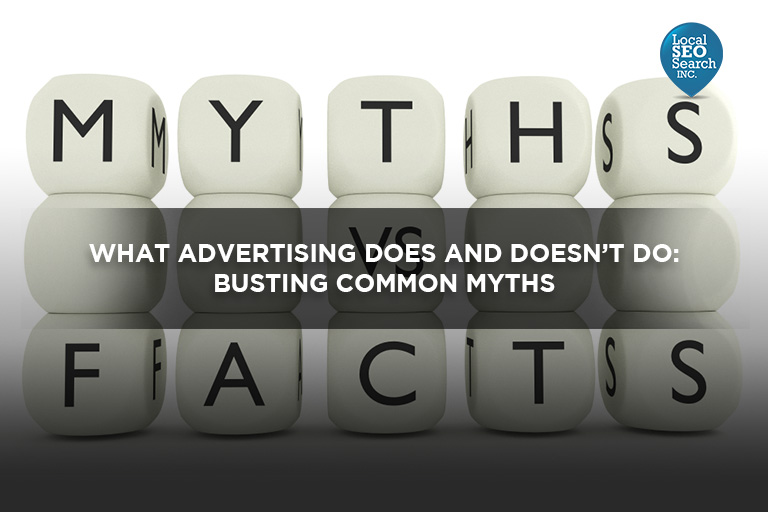0/5
(0 Reviews)


Advertising is one of the most common ways that businesses raise awareness about their company, products, and services. However, not all business owners understand the benefits and drawbacks of using advertising as a primary marketing method.
There are a lot of myths that are widely believed about advertising and its role in small business marketing. This article will explore those myths and reveal the truth.
Let’s get started!

One of the biggest mistakes you can make is to only advertise when business is slow. Unfortunately, it’s very common!
Many business owners feel like they don’t have time to run ads when things are busy, and they don’t want too much work. The truth is that if you only run advertising when business is slow, you’ll live in a constant feast-or-famine cycle.
If you keep your advertising going consistently, you’ll have consistent business and new customers, which is exactly what you want. Do you ever stop seeing Coca-Cola ads? They keep business strong by advertising regularly.

When you’re looking at what advertising does and doesn’t do, remember that advertising can’t create demand that isn’t there. The goal is to make sure that your products and services are something that your ideal customers really benefit from.
If you introduce a new product or service, then advertising can help you get the word out and make people aware that they can contact you for that need. But if it’s not new and just not selling, more advertising isn’t going to help.
Instead, cut your losses and minimize or discontinue the slow-moving offers. Instead, focus on advertising and marketing that amplifies the items you have that customers truly want.

Many times humour can capture attention and make an ad more memorable. Just look at Boneshaker’s tongue-in-cheek “Endless Slogans” commercial.
However, the humour needs to still communicate the key message — that you understand the needs of your customers and can meet those needs with your products and services. You can be funny without ever getting that across.
The last thing you want to do is pay for an ad that makes people laugh, but they have no idea what the name of your company is or what you offer. Laughter is great, but spending money with no return on that investment isn’t something you can afford to do, especially as a small business.
Instead, find fun ways to talk about real consumer problems and the way that your business can help. You’ll get a smile AND a lead!

Being unusual and standing out is nice, but it’s not always the best advertising. We just mentioned how being funny can distract from your real message. The same is true of an ad that’s too far “outside the box.”
A perfect example is the “Puppy Monkey Baby” commercial that Pepsi released in 2016 to advertise Mountain Dew. The ad was so strange that many people were put off, and while people certainly talked about the commercial, they often didn’t remember what was actually being advertised. All they knew was that the ad was weird.
Here’s the truth: The best advertising clearly describes a real need your customers have and presents your product or service as the best solution to that need. It doesn’t need to be sexy or funny or anything else. It simply needs to connect at an emotional level and draw consumers in with the promise of meeting their needs.

The final myth we’ll look at in this article is that advertising is too expensive for small businesses. Too many business owners look at advertising as an expense instead of an investment.
Advertising certainly can be expensive, if you’re targeting a very broad audience using television or radio. However, when you advertise to a targeted ideal audience using digital methods, like social media ads, you can connect with the right people on a far smaller budget.
Best of all, targeted advertising is much more effective than traditional, broad ads. You’re only talking to those who are the most likely to benefit from your product or service, which means you aren’t wasting your time or money on people who find your message irrelevant.
Over time, you can use other marketing tactics to bring in ideal leads and ready-to-buy customers, which reduces the amount of money you need to spend on advertising. For example, search engine optimization (SEO) can bring in ideal customers on a regular basis once you earn a page one ranking on Google. Once that happens, you won’t have to advertise as much, saving you money.
Done properly, advertising is very affordable for a small business.

Advertising can help you build awareness about your business and reach ideal customers. However, it should be combined with other long-term marketing strategies, like SEO, so that you’re not overly reliant on ads.
Busting myths helps you understand how to maximize the ROI of your advertising. If you’d like help setting up a comprehensive digital marketing strategy, we’re here for you. We’ve helped thousands of small businesses succeed online. Contact us today to see what we can do for you!
